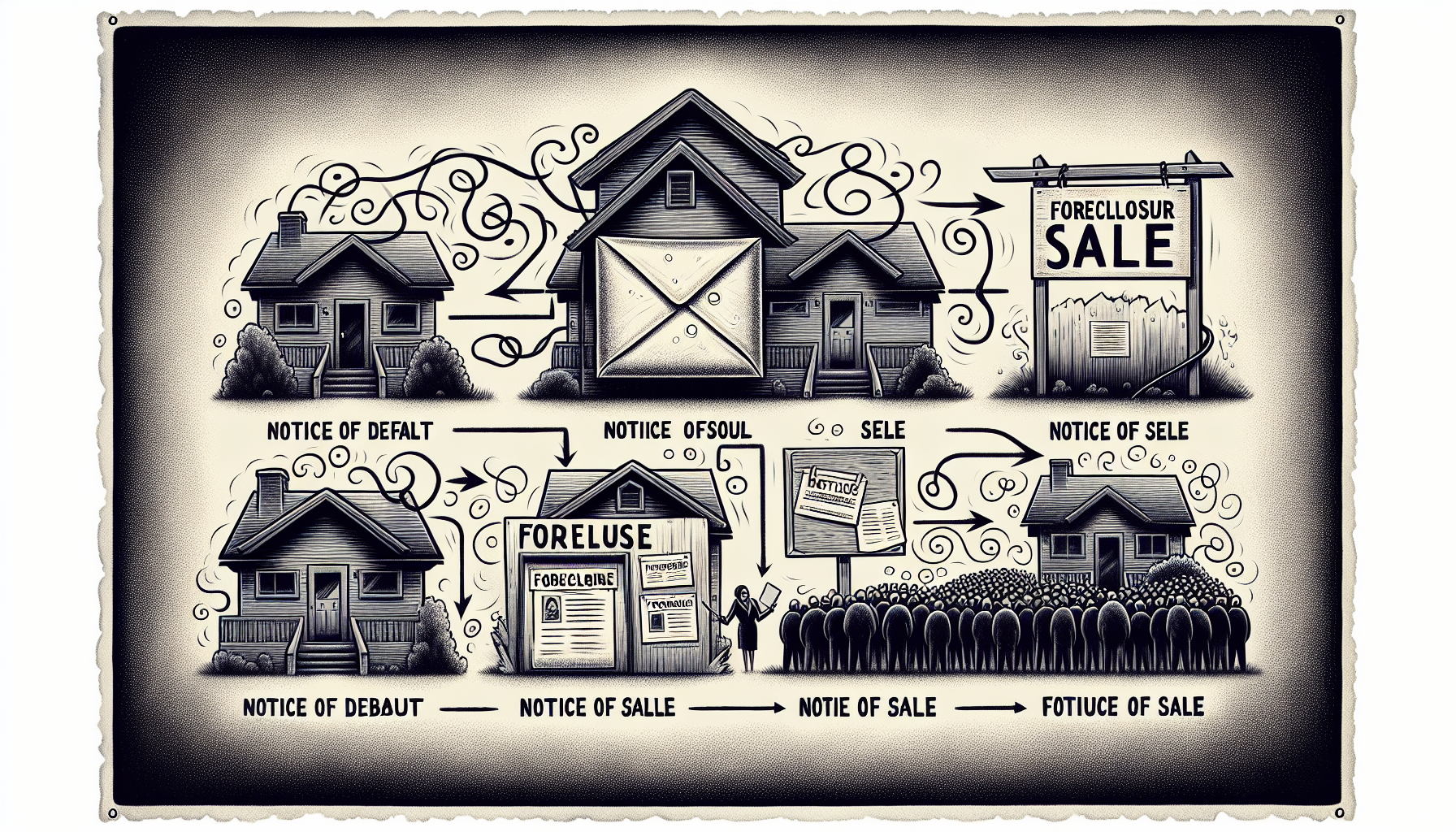

The arrival of a notice of foreclosure letter signals the need for swift and strategic decision-making. In this article, we guide you through the steps to effectively respond, detail immediate moves to make, and evaluate avenues for potentially stopping the foreclosure in its tracks. With these insights, you can take a position of informed action to address your notice of foreclosure.
A foreclosure notice is not merely a piece of paper; it’s a critical signal from your lender that they intend to initiate the foreclosure process. This process kicks into gear when a homeowner becomes at least 120 days delinquent on their mortgage payments. However, it’s important to remember that receiving a foreclosure notice does not necessarily mean that you will lose your home. It signifies that you’re at risk, but you still have options to prevent the foreclosure sale. Some options to consider include:
By exploring these options and taking action, you may be able to avoid foreclosure and keep your home.
Initially, after falling behind on payments, homeowners receive a breach letter outlining foreclosure alternatives and a notice of default when delinquent over 45 days. A foreclosure notice follows as the formal commencement of the home auction process, also known as a foreclosure auction. Understanding your foreclosure notice is a crucial step in determining your next course of action.
Upon receiving a foreclosure notice, it’s important not to panic, but to act swiftly and decisively. Foreclosure notices require immediate attention to prevent the foreclosure sale of the home. The critical period to take action is within 30 days of receiving the notice to avoid losing default judgement options.
This involves reviewing the notice, contacting your mortgage servicer, and consulting with a housing counselor or attorney to explore your options and devise a plan when facing foreclosure.
The first step upon receiving a foreclosure notice is to review it thoroughly. The notice of default will specify the exact amount you owe. It’s crucial to understand this amount and the deadline by which it must be paid to avoid foreclosure.
While reviewing the notice, ensure all information is accurate. Any discrepancies or errors can potentially alter your course of action. Understanding the details of the default and figuring out the options available to you will provide a clear path forward.
As soon as you’ve reviewed the notice and understood its implications, it’s time to contact your mortgage servicer. This immediate communication is vital in opening a line of discussion about potential solutions to your situation.
Your mortgage servicer can offer different options like loan modification or structured payment plans to help you avoid foreclosure. Having a conversation with them will help you understand why you received the foreclosure notice and how you can potentially resolve the situation.
After you’ve spoken with your mortgage servicer, it’s beneficial to consult with a housing counselor or attorney, as well as research a reputable mortgage company. These professionals can aid in identifying potential flaws in the foreclosure complaint that you may overlook. They can also assist you in exploring loan modifications and other options to avoid foreclosure.
At Kelly Legal Group, our experienced attorneys specialize in guiding clients through the complex process of mortgage modifications. We offer free consultations to help you understand your situation and devise a tailored plan of action to secure your home and financial stability.

Understanding the foreclosure process in Texas can help you make informed decisions about your situation. The process typically includes the following steps:
By understanding these steps, you can better navigate the foreclosure process in Texas.
Texas uses both judicial and nonjudicial foreclosure processes, but the nonjudicial foreclosure process is more common due to a power of sale clause typically included in the deed of trust. In the non-judicial foreclosure process, an Application For Expedited Order can allow lienholders to proceed with a foreclosure without a court judgment.
It’s worth noting that homeowners in Texas lack a statutory redemption period, meaning they cannot reclaim their real property after a foreclosure sale.
While receiving a foreclosure notice can be daunting, it’s important to remember that you have options to halt the foreclosure sale. These options include:
Exploring these options can provide you with a lifeline to save your home, maintain your credit, and regain control of your financial situation.
Loan modifications and refinancing are two options that can help you manage your monthly mortgage payments more effectively. A loan modification allows you to negotiate with your lender to adjust the mortgage terms, making payments more manageable and helping you avoid foreclosure. This could allow you to add missed mortgage payments to the loan and change the loan term and interest rate to reduce monthly payments.
On the other hand, refinancing involves:
Another option to halt the foreclosure sale is a forbearance agreement. This is a temporary postponement of mortgage payments, allowing you to avoid immediately defaulting on your loan if you’re experiencing temporary hardships.
By agreeing to a forbearance, the lender permits you to stop making mortgage payments temporarily and agrees not to foreclose on the property during this period. This can provide you with the breathing room you need to manage your financial situation and explore other options to avoid foreclosure.
If loan modifications, refinancing, or forbearance agreements are not feasible or sufficient to halt the foreclosure, you may consider a short sale or a deed in lieu of foreclosure. A short sale involves selling your home and using the proceeds to pay off the mortgage. If the sale price is lower than the mortgage debt, the lender may write off the remaining balance.
Alternatively, a deed in lieu of foreclosure involves handing over the property title to the lender to satisfy the debt. While these options may sound drastic, they can offer a way out of foreclosure and help you start rebuilding your financial stability.
While navigating the foreclosure process, it’s essential to protect your credit. A foreclosure entry remains on a credit report for seven years from the date of the first missed payment that initiated the foreclosure process. The most substantial negative impact on credit scores occurs in the initial months and years after a foreclosure entry, with the effect diminishing over time.
To protect your credit, here are some steps you can take:
In addition to exploring options to halt the foreclosure process, you can also utilize legal defenses against foreclosure actions. This can involve:
It’s advised to seek counsel from a foreclosure defense attorney to comprehend available legal strategies, including foreclosure laws, and form a defensive argument. Identifying substantive errors, such as miscredited payments or inaccurate statements of amounts due, provides a basis for challenging the foreclosure action. If the foreclosing party has violated federal laws or made procedural errors, you may have a valid legal ground to dispute the foreclosure.

While navigating the foreclosure process, it’s also essential to prepare for life after foreclosure. Securing rental housing before a foreclosure appears on your credit report can ease the transition to new housing. Be prepared for tenant screening processes, which involve income verification, credit checks, and sometimes criminal background checks.
Being upfront about foreclosure in the rental application can demonstrate responsibility and sincerity to future landlords. Furthermore, maintaining good standing on other credit accounts is vital for securing a rental after experiencing foreclosure.
Ultimately, rebuilding financial stability after foreclosure involves effective budget management, rebuilding credit over time, and exploring paths to regain homeownership when financially ready.
In some cases, to file bankruptcy might be the best strategy to halt foreclosure. Both Chapter 13 and Chapter 7 bankruptcy can temporarily halt all creditor collection activities, including foreclosure, by issuing an automatic stay.
While Chapter 7 bankruptcy may temporarily delay foreclosure, it does not facilitate keeping the home when payments are delayed. In contrast, Chapter 13 bankruptcy allows for repayment over time to save the home. It provides a structured repayment plan to manage mortgage payments and stop foreclosure, while also allowing for the discharge of other debts, lightening overall financial obligations.
The county clerk plays a crucial role in the foreclosure process. In non-judicial foreclosure cases, the county clerk is tasked with the filing of a Notice of Sale. This notice must also be publicly posted on the courthouse door.
In judicial foreclosure scenarios, the clerk of the court issues an Order of Sale which instructs the sheriff or constable to carry out the auction. Understanding the role of the county clerk can provide you with a clearer picture of the foreclosure process and the legalities involved.
In the midst of navigating foreclosure, it’s crucial to stay vigilant and avoid scams and predatory practices. Some common scams and predatory practices to watch out for include:
By being aware of these scams and predatory practices, you can protect yourself and make informed decisions during the foreclosure process.
Be wary of entities using public records to identify and target those with foreclosure notices through offerings with phrases like ‘We can stop your foreclosure!’ or ‘Immediate approval!’. Also, be cautious of mortgage servicers that accumulate illegal fees or engage in ‘dual tracking,’ where foreclosure proceedings continue despite ongoing loss mitigation negotiations.
If you’re behind in payments or have unfavorable loan terms, the Kelly Legal Group is here to help. Our experienced attorneys can guide you through the process, helping you explore loan modifications and other options to avoid foreclosure.
To receive a FREE consultation, contact us online or call us at (512) 505-0053 today!
By Jeff Kelly | April 24th, 2024 | Real Estate Law | Comments Off on What to Do If You Have Received a Foreclosure Notice from Your Lender
Share This Story, Choose Your Platform!